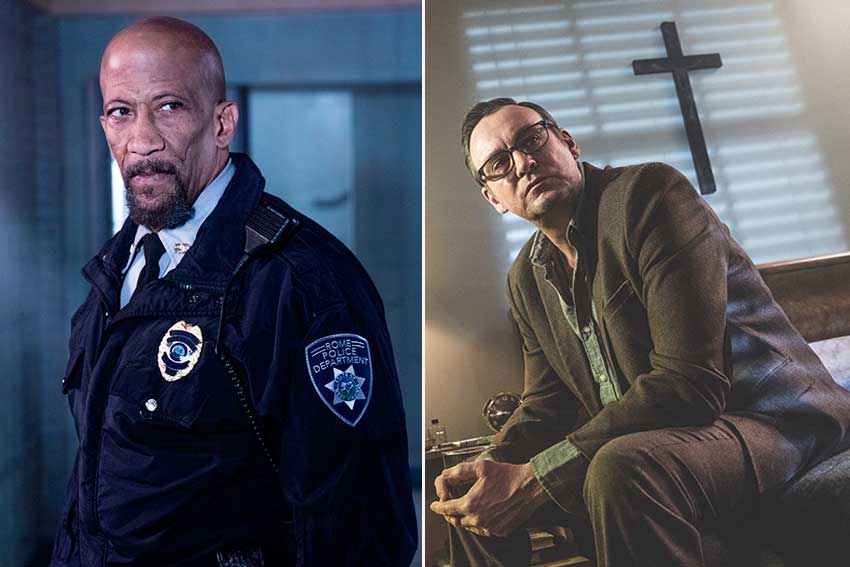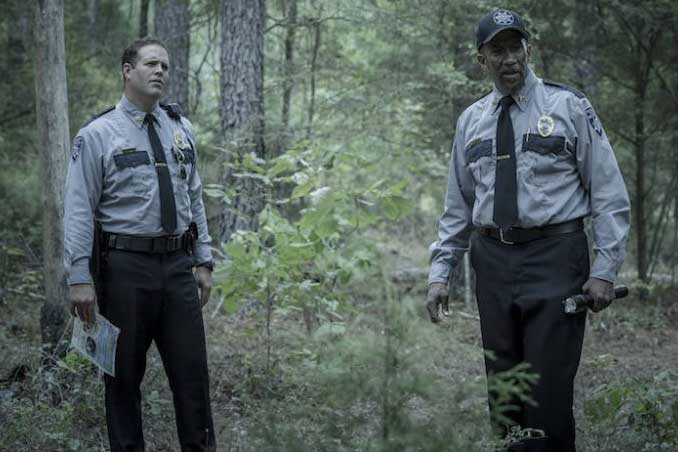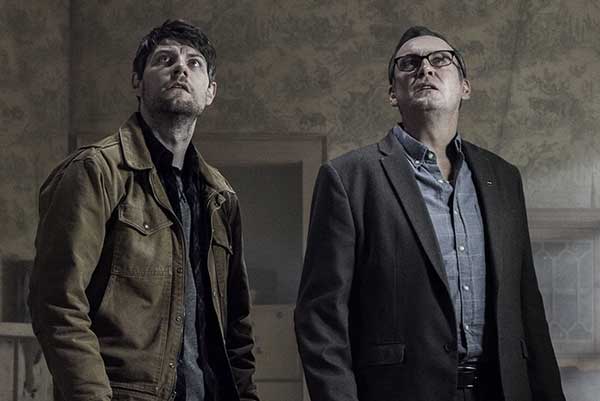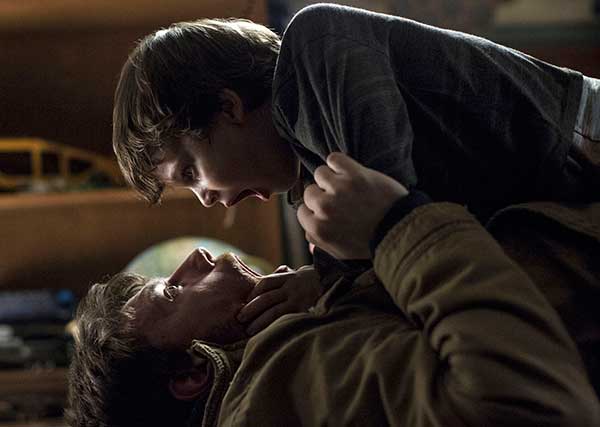'Outcast' Stars Reg E. Cathey and Philip Glenister Talk Robert Kirkman's New Show
- Details
- Category: Interviews
- Published: Friday, 17 June 2016 08:37
- Written by Fred Topel

If you have a show about demonic possession, you need an exorcist. For "Outcast," that exorcist is Reverend Anderson (Philip Glenister). He enlists Kyle Barnes (Patrick Fugit) to help him perform exorcism for the town’s possessed residents. We already saw one brutal exorcism in the pilot.
The demons in town also have to contend with the law. Chief Giles (Reg. E. Cathey) tries to maintain law and order but he may be in over his head. We got to sit in a roundtable interview with Glenister and Cathey to talk about "Outcast," from creator Robert Kirkman ("The Walking Dead") and based on his comic book. "Outcast" airs Fridays at 10PM on Cinemax.
Q: Is playing a preacher sort of a performance within a performance?
PG: Yeah, in places, certainly. Doing the preachy sermon stuff. I watched some of these TV evangelists for a bit of research to see how they deliver and perform, if you like, and act. There was one guy in particular I’d seen who was very persuasive, very cool, very young and very modern, not shouty or anything and incredibly persuasive. It was that feeling of he’s, within his domain, he’s a bit of a rock star figure almost with this devout following. I kind of figured that Anderson is the big fish in a small pond in many respects. He has his flock, his congregation who are very loyal to him and the church because he’s a little bit different. He’s a little bit out there. He harbors a lot of his own personal demons if you like. Then all the complexities of the character then when he’s with Giles and they have obviously a very strong, honest relationship, close relationship, there’s a lot of trust there I think and respect. It’s completely different Anderson that you see.
Q: Are any of those sermons directly from the comic books?
PG: I think little bits of them are. I only really read the first two comic books and after that I purposefully kept away. I liked the idea we were getting the scripts not that far in advance. So I kind of liked the idea of not really knowing where he was going, knowing that something was going to be around the corner but not quite knowing. So you have that more instinctive approach. That’s what I really like about this writing. I love writing that takes you on a journey and then takes you on a different route to the one you think you’re going. It works for drama and it just takes you off the main drag if you like.
RC: Then you don’t play the end.
PG: Exactly. You just live in the moment and stay in the moment.
RC: We’re old fashioned though I think.
PG: Yeah, but I still think if it works, don’t change it.
Q: To what extent do you each believe in possession?
RC: It’s funny, sometimes I believe very much because there are more things on this earth than are taught in your philosophy, Horatio. But, other times I think it’s completely ridiculous.
PG: I’m skeptical, I would say. I used to be one of those agnostics. I’d sit on the fence, because I think like Reg, I think we seem to use such a small part of our brain in terms of what’s out there and what we’re capable of. And then we haven’t tapped into stuff, but I wouldn’t have the arrogance to say, “That’s it, nothing more.” I’m probably more of a nonbeliever. I don’t know. Sometimes you do look at this planet and think, “My God, there must be other life forces out there somewhere. Why wouldn’t there be if we’re here?”
Q: Does working on a project like this make you more or less of a believer?
RC: Well, from what we’re doing, being a believer never even has to come up. We get the script and we’re going to perform whatever it is to the best of our abilities. I think all of the core nucleus of the cast are more interested in being amazing actors than I don’t even know the word.
PG: From my point of view, obviously playing someone like a preacher who obviously sees himself as a son of God and has to be passionate and has this innate belief to begin with certainly when we meet him. Then I have to dispel my own feelings about him and tap into somebody who has taken up this journey and neglected his whole family life. He’s estranged from his wife and his son.
RC: But you’re not going to become a preacher.
PG: No, no, no, absolutely not. I don’t take it home with me. As a character, as a human being, what’s fascinating for me and what really compelled me to wanting to play the role is the fact that he starts questioning his faith and he really starts questioning his belief and what’s going on. He’s very much a broken man and very melancholic, a lonely figure who’s in complete denial. That’s the human being. That’s the human side of this man which is the joy of playing the part and the challenge of playing the part, to make that believable. In a way, the preachy stuff, getting up there and going, “We’re gonna heal,” that’s kind of the easy bit in a way because you’re just up there shouting your head off. We shot that scene, and I said to Howie who was directing, “It’d be great to just not even rehearse it.” I’d really gotten the lines off pat and studied it because it was a lot of dialogue. I said, “Is there any way we could just shoot one without anybody knowing and just go into it and see what happens?” And he went, “Yeah, absolutely.”
Q: What do you think it will take to make the chief a believer?
RC: I think the chief’s main goal that he wants is the town to be together. He loves his town. He loves the pain that he’s had to go through being the white police chief in this little town, the maturity that that’s brought with him. If being a believer helps the town, we’re going to church. Of course, he knows that’s not going to happen, so whew. I loved playing the chief. During this press that we’ve been doing now for a month, a lot of what I’ve come to find about our little crew is that we like acting with each other more than anything. So that the acting becomes - Whatever is happening, whatever is going on, we’re going to be acting great today. We’re going to do the best scene. We’re going to have the best time and we’re going to work harder than we did yesterday. So that I think --
PG: With the goal of finishing earlier.
RC: Yes, with the goal of finishing earlier.
PG: Get it right, get the lines right so we can get out of here.
RC: Because truthfully The Devil only comes out at night. Doing night shoots for a year, The Devil could come out next year in the daytime I’m thinking. The Devil could come out at six in the morning as far as I’m concerned.
PG: And I think he’s done by about 11. He’s tired by then. He’s exhausted and he needs at least three hours for lunch.
Q: Did Robert give you extra insights into your characters?
PG: I think he pretty much left us to our own devices. The great beauty of Robert, one of his great strengths and skills is his trust in people. He knows what his expertise is. His expertise is in comic books and creating those stories. As he always said all along to Chris, our show runner, “You are the guys that make TV movies. That’s your expertise. I do the comic books so I trust you guys to do it.” Of course he would oversee everything, quite rightly and if there were little tweaks, he would make them. You can come across writers who are incredibly precious. You change one word and you get the conference phone call and the lawyer. I skipped an “and.”
RC: I worked for David Simon who was one of those guys. You had to say every word. If that happens here, we would handle it. It would be like we did in The Wire where okay, we’re going to do every word and we’re still going to have fun doing it.
PG: Oh yeah, but it’s just nice to have that kind of freedom because sometimes things that are on the page are necessarily, especially when you’re writing 10 episodes, don’t translate off the page. I love that where you can’t just go, “No, I’m not saying that. That’s no good. Come back to me with something. I’m not interested.” You have an alternative. You say, “What about this?” Reggie and I used to do that quite a lot. To the point we’d go, “You know, we don’t need all that. We could do that with a look.”
RC: A look would be awesome.
PG: There you go, there’s the scene. We should’ve been doing silent movies, my friend.
RC: Chris Black and Howie Deutch though, and the writers.
PG: It was a very collaborative process. You didn’t feel like you’re just the actor, turn up, hit your marks, say your lines and go home. I was very much a collaborative process. I think that always makes for a happierset. Everybody’s comfortable and happy to work.
RC: It’s like Shakespeare. He never bothers you. Willie Shakespeare never calls to complain.
PG: Yeah, that’s because he’s been dead, kid.
RC: Exactly.
PG: But that’s because it’s open to interpretation. He just writes it and says, “Okay, here you go.”
Q: Does it affect him more that he realizes he wasn’t helping people as much as he thought he was, or is it more that he has to rely on somebody else to help him do the job?
PG: I think it’s a bit of both. It’s a slow dawning realization that the fact that he gave his life over to this and it’s sort of falling apart at the seams is causing him a kind of nervous breakdown almost. Then obviously Kyle comes along with this gift and it’s that classic thing. I always think it’s a bit like Rocky. You’ve got Burgess Meredith, the trainer, and he was the kid in his day and then the new kid on the block comes along and usurps him. It’s always that feeling of was it all worth it? What have I done? Does it mean anything? I think that’s one of the great tragedies about the reverend, about Anderson’s character. There is inside a slightly broken man who’s clinging onto this belief and trying desperately to do the right thing. This is why he’s probably drinking too much and smokes too much.
RC: It’s not feeding him either the way it used to.
PG: Exactly, and it’s just sort of cutting himself off from the realities of the situation. I think that’s what makes him such a compelling sort of character and complex human being, and very human in that respect.
RC: It was fun to play scenes with you when you were going through that.
PG: Well, I really was, love. I’m method, mate.
Q: These exorcisms are a lot more physical than we usually see. How physical were those scenes?
PG: It’s one of those things that when you look at it all cut together on TV and it looks amazing and extraordinary, but the magic of TV on film. It doesn’t when you’re actually shooting it. It took about two and a half days to shoot the exorcism of Joshua. Adam Wingard had storyboards, massive, huge big storyboards with each scene. Every time we got the shot, a cross would go across the next one. So it was very much done as kind of dot, dot, dot, dot, a bit like a jigsaw puzzle. Gabriel was an extraordinary child, incredibly committed.
RC: He’s one of those creatures in real life where you go, “My God, he’s amazing.”
PG: Just very instinctive and brilliant with Patrick and Patrick was brilliant with him. They bonded on set, almost father/son, older brother/younger brother. Patrick I think on purpose made a beeline to befriend Gabriel and Gabriel was so smart that he would just outwit Patrick all the time. They had this brilliant relationship on the set. I mean, really close, really trusting. It was a joy to behold actually watching it. I just kept thinking, “He’s going to make a good Dad, Patrick.”
RC: But it’s really hard and physical to do that, all that stuff. I didn’t have to do it. I would usually come in afterwards and see them sweating. I’ll give you a perfect example. I saw The Revenant, the whole bear thing, and I was like, okay, I’m not young like that guy but f*** that. that’s not acting. For me. I don’t want to do that.
PG: It’s very effective. It looks great.
RC: That’s like playing football. The whole movie, then after that, the whole movie, I was like, “This is something I don’t want to do.”
PG: The thing we’ve said all along I think in this is the fact that we feel this is very character driven, so any of those scenes where obviously there are some quite dark and upsetting scenes, but rather than just being gratuitous and there for the sake of it, we feel that the story is earned. We’ve earned the right to have those scenes in because of all the other stuff.
RC: But tell the truth, you don’t wanna fight no devils no more.
PG: Oh, f*** that.


